9 Strategies on How to Generate Leads from Your Website

I hope you enjoy this blog post. If you want Hello Bar to grow your leads, click here.
Author:
Ryan Bettencourt
Published
July 8, 2024
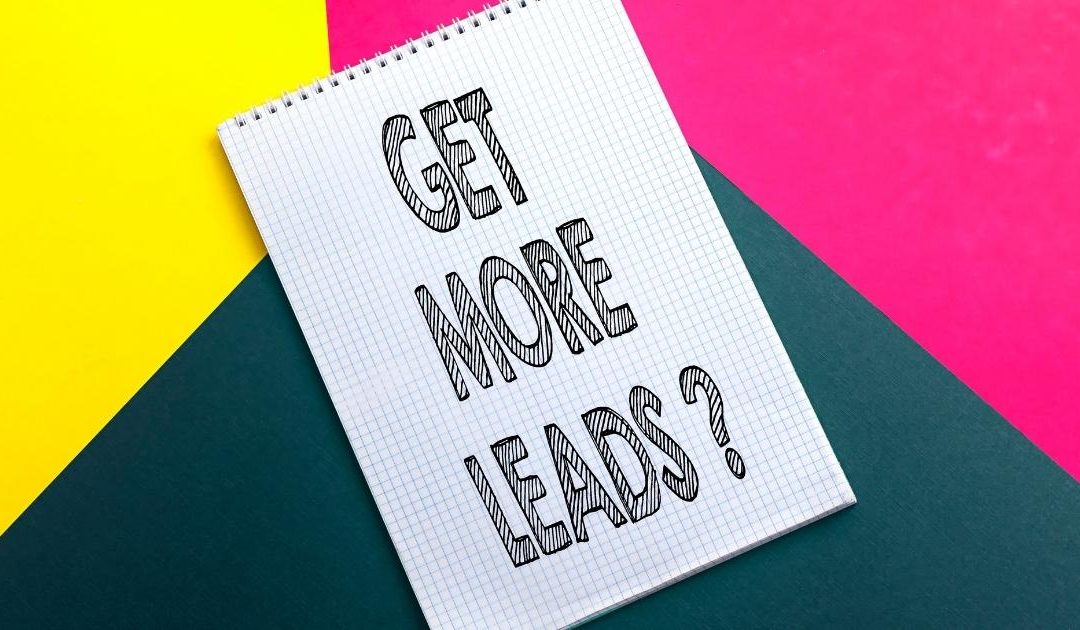
Generating leads from your website requires more than just adding a CTA button in one corner and expecting leads to come pouring in.
You need to use multiple website lead-generation strategies to get the desired results. You may need to experiment a bit to figure out what works best for your audience and website.
However, with the right strategies, you can easily generate more leads from your website. Once you have the right mix of strategies, you can even run website lead-generation funnels on autopilot.
So, which strategies should you use to generate more leads from your website?
Here are our top nine picks to get you started.
1. Create Valuable Content
Your website’s content is one of its most important assets.
If you aim to generate more leads from your website, you need to first attract more site traffic and that’s where content helps.
You need to create valuable and relevant content that attracts the right audience to your website, instead of making each piece of content a sales pitch.
Start by understanding your target audience and the broad topics they would be interested in. Then, conduct keyword research to find specific keywords you can target with your website and blog content.
Create a separate piece of content for each keyword, covering the topic in detail. Optimize your content with the main keyword and related keywords to provide more context to search engines about your content.
This will help you rank high on search engine results pages (SERP) and attract more site traffic.
If your audience finds your content useful, they’ll likely engage with other pages on your site and, eventually, take other desired actions. This includes signing up for your newsletter, downloading a resource, making a purchase, or anything else.
As soon as a site visitor takes any of these actions, a lead is generated for your business.
Of course, this is one of the website lead-generation strategies that work in tandem with other tactics to drive the best results. So, read on to learn more strategies to generate email leads from your website.
Pro Tip: If you accept guest posts on your blog, use an AI detector and a plagiarism checker to ensure any content you publish is original and of high quality.
2. Optimize Your Website for SEO
The more site traffic you get, the more leads you can generate from your website. To get more site traffic, you need to make your website more visible on SERP and that’s where SEO comes into the picture.
By optimizing your website for search engines, you can ensure that more people see your content.
Here are some SEO tactics you can use to improve your website visibility and rankings on SERP.
- Leverage keyword optimization, not just for your blog content, but across your website. Optimize your meta descriptions, title tags, header tags, and more for keywords. Ensure that each of your web pages targets a specific keyword. Using Google scraping to get accurate and reliable information is a tried-and-true strategy for relevant results and stronger keyword strategies.
- Build relevant, high-quality backlinks from authoritative sites within your niche. This signals to search engines that other websites trust your content, which helps build your site’s authority and reputation.
- Ensure that your site loads quickly and is optimized for mobile devices.
- Keep your site layout and navigation simple, ensuring site visitors can easily navigate it and find what they’re looking for.
- Leverage internal linking to direct your site visitors to other relevant pages and engage them longer.
So, how do these effective SEO techniques help you generate more leads from your website?
It works similarly to the previous strategy—if more people visit your site, you’ll have more opportunities for lead generation.
The more people engage with your website, the higher their chances of engaging with your CTAs, forms, and other lead-generation tools.
3. Use Social Media to Promote Your Content
Social media is a great way to promote your content and increase leads.
By sharing your blog content on social media, you can reach a larger audience and attract more organic visitors to your website. One easy way to do this is by sharing excerpts of your latest blog post on social media, with a link to direct people to your blog. From there, you can use other ecommerce lead-generation tactics to convert the visitors into leads.
You can also use social media to create relationships with potential customers.
This can be done by engaging with your followers and providing valuable content.
When you provide helpful information and build relationships with your followers, they will be more likely to do business with you.
Social media can also help to build trust with potential customers. You can leverage a social media plugin to display customer testimonials on your website from different social platforms.
Make sure you add links to your website in your social media bios to direct social traffic to your website. Anyone who discovers your business on social media should be able to visit your website at the click of a button.
You should also include links to your landing pages when hosting social media contests or giveaways or running any other social media promotions.
Check out Hello Bar’s Facebook page, for instance. It has a link to the website, a “Learn More” CTA button, and posts with links.
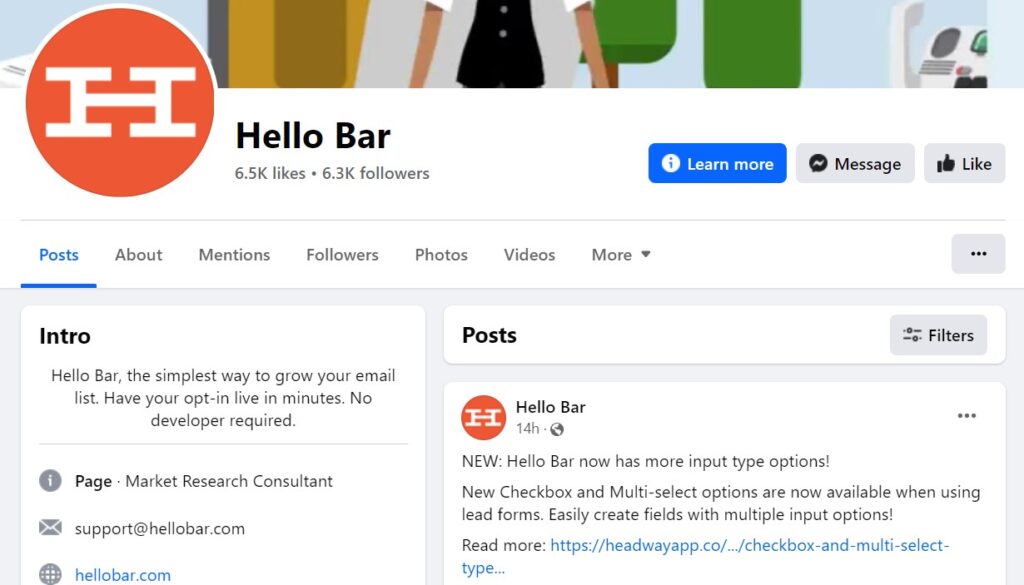
Image via Facebook
4. Strategically Place Calls to Action on Your Website
The previous three strategies focused on driving more traffic to your website. But how will you convert your site visitors into leads?
One of the most effective ways to generate leads from your website is using calls to action.
These are strategically placed throughout the website to nudge site visitors to take a desired action, such as signing up for your newsletter. You can place them in header or footer sections of your website, in the sidebar, or within your blog content.
The key is to ensure that your CTAs are visible and stand out on a page.
There are multiple calls to action that you can use on your website.
Some of the most common calls to action include:
- Sign up for our mailing list
- Download our free ebook
- Request a consultation
- Call us now
This strategy, combined with valuable content, will help you generate more leads from your website.
Ensure you have a call to action on every page of your website.
Also, use strong action words to make your CTAs more compelling and impactful.
Check out our homepage to see how we’ve used multiple CTAs throughout the page, including header, footer, top banner, and sidebar.
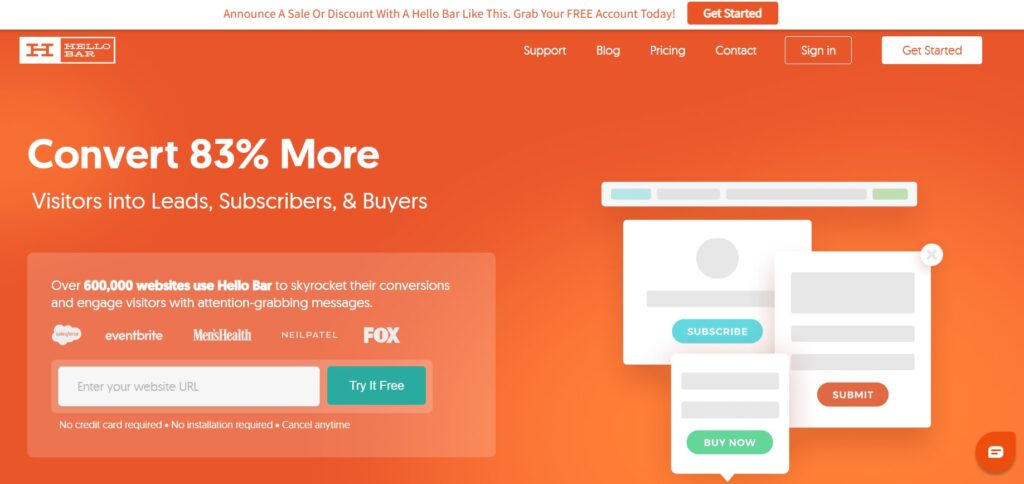
Image via Hello Bar
5. Create Optimized Landing Pages
Landing pages are another great way to increase leads on your website and one of the best B2B lead-generation strategies.
A landing page is a standalone page designed to promote a specific product, service, or ongoing offer. If you’re running lead-generation campaigns on multiple channels, you need to drive traffic to your landing pages to capture leads.
Landing pages capture leads by asking visitors to provide their contact information.
Here are some tips for creating high-converting landing pages to generate more leads from your website.
- Create a dedicated landing page for each product, service, or offer to create targeted lead-generation funnels. For instance, if you have multiple lead magnets, such as ebooks or online courses, create a landing page for each.
- Use persuasive copy to list the benefits of what you’re offering and nudge prospects to take the desired action.
- Ensure your CTAs are clearly visible and the focus of the page.
- Leverage forms to convert visitors into leads by capturing their contact information.
- Use a minimal, clutter-free website design to keep the focus on your key message and CTAs.
HubSpot, for example, has tons of ebooks, educational videos, and other resources on its website. It has dedicated landing pages for each, with a persuasive copy to ask people to download the resource in exchange for their contact information.
Here’s one such landing page. Note how they’ve listed what a reader will get by downloading the ebook and a detailed table of contents.
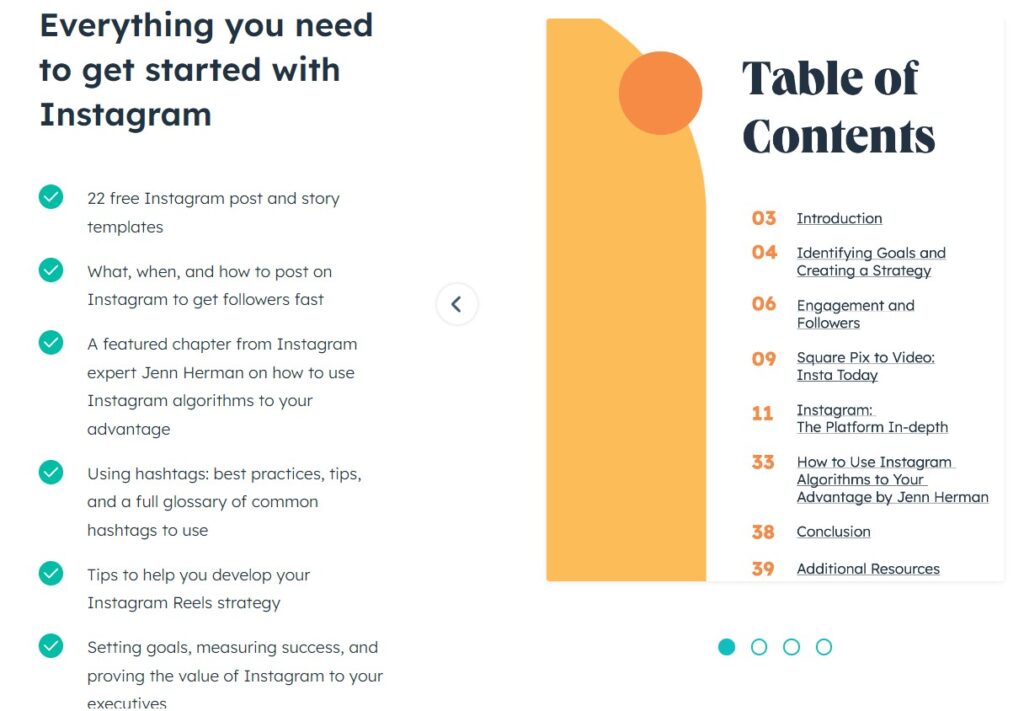
Image via HubSpot
The “Download Now” CTA in bright orange color stands out on the white background of the page. Once someone clicks on it, they’re required to provide their email address to access the ebook.
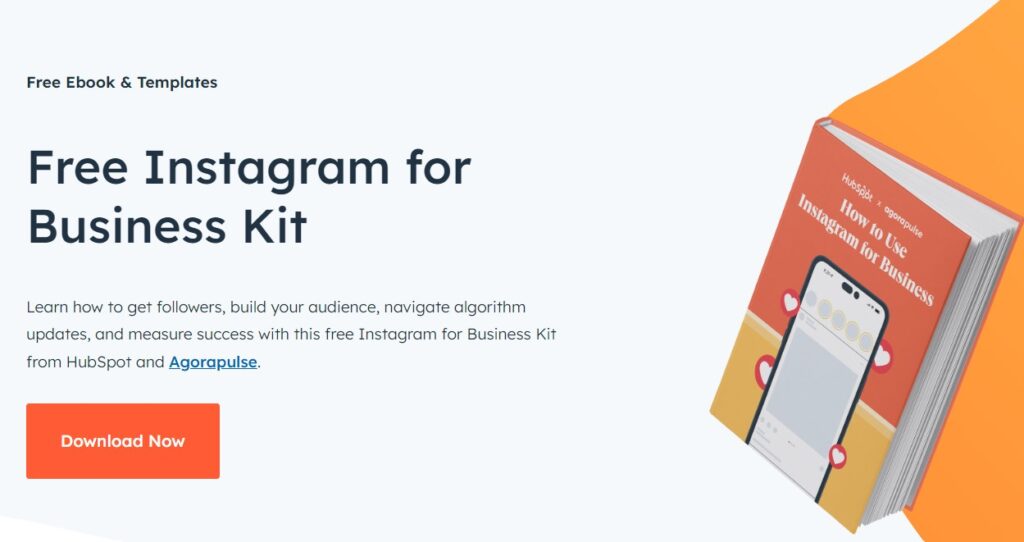
Image via HubSpot
You can use these email addresses to build your email list and run lead-nurturing email campaigns. You also need to make sure that your email list is up-to-date, to get the best results.
Additionally, improve the email’s deliverability rate by learning what is DMARC and enabling the email security protocols.
6. Place Forms on Your Website
Forms are one of the primary ways of generating leads from a website. All other tactics nudge site visitors in the right direction, but forms actually capture leads by taking their contact information.
Strategically place opt-in or lead-capture forms throughout your website to collect site visitors’ contact information. Then, add them to your email lists for lead nurturing.
There are many different forms that you can use on your website.
Some of the most common forms include:
- Request a consultation
- Sign up for our mailing list
- Request a free trial
This method and email marketing go hand in hand because you get the person’s email who filled out the form. You can send them lead-nurturing emails to turn leads into customers.
Here are some best practices you should follow to create high-converting website forms.
- Keep them short and include only the necessary fields, such as name and email address. The easier it is to fill out a form, the more people are likely to fill it out.
- In case you need more information, use multi-step forms with just 1-2 fields at each step. This ensures you generate only relevant leads—people who are interested enough to complete the various steps in the form.
- Place forms so they’re visible but don’t intrude or disrupt a person’s browsing experience.
- Use strong CTAs to encourage people to fill out your forms and give them a reason for doing so by mentioning the benefits.
- Set clear expectations of what will happen once someone completes a form. Also, remove their hesitation by disclosing why and how often you will contact them. For instance, if they’re subscribing to your newsletter, let them know how frequently you send one.
Check out our sign-up form, as an example. It has just three form fields and also provides new users an option to sign up using their Google login, making the process simpler.
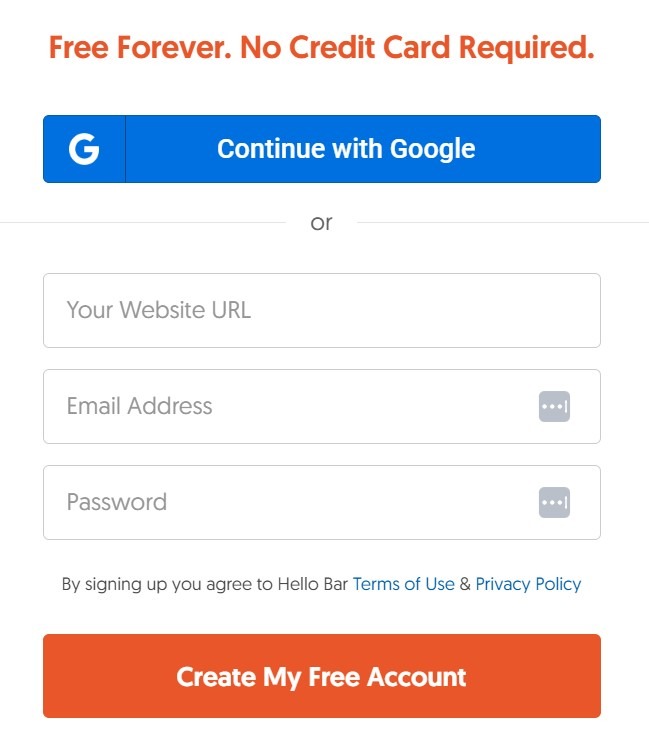
Image via Hello Bar
By mentioning that no credit card is required to create a free account, we remove any hesitation users may have regarding creating an account.
7. Offer Lucrative Incentives
Irrespective of which website lead-generation tactics you use, you should provide a good incentive for site visitors to give you their contact information.
Without a good incentive, your website lead-generation strategy will likely fail.
You can offer many different incentives, and the best motivation will vary depending on your business and target audience.
Some common incentives include:
- Free samples
- Free trials
- Discounts
- Free content or resources
- Access to free tools or calculators
The kind of incentive you provide will depend on your end goal. If you want site visitors to buy your products, discounts and offers will be your best bet.
Similarly, if you want people to provide their contact information and agree to receive communications from you, lead magnets work well.
A lead magnet is a valuable resource that your target audience is interested in and you offer it in exchange for their contact information. This could be a free tool, ebook, online course, webinar, or anything else.
As long as it is valuable and you’re giving it off for free, people would be willing to give their email addresses to access it. It’s a good incentive.
The incentives you offer don’t necessarily have to be monetary. You can simply list the benefits of taking an action, such as subscribing to your newsletter.
Check out how Ulta Beauty lists the rewards of signing up and makes it pop out on its homepage.
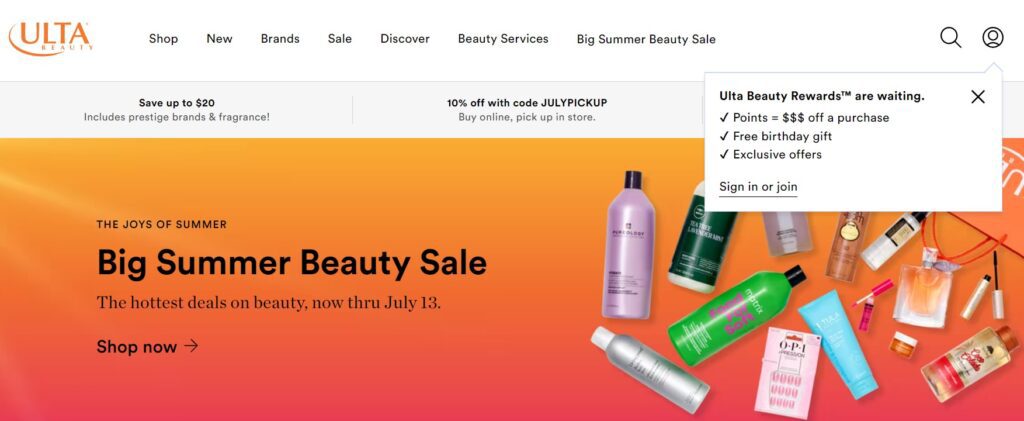
Image via Ulta Beauty
Alternatively, you can also offer non-monetary incentives like free shipping, just like Blue Bottle Coffee does in the example below.
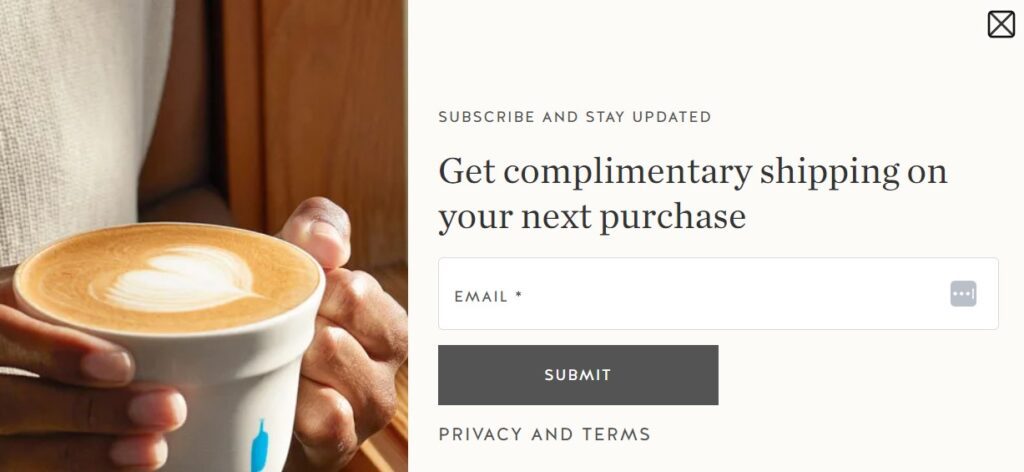
Image via Blue Bottle Coffee
8. Use Popups
Using popups is one of the most popular ways to generate leads from a website.
Unlike opt-in forms, which are displayed on the website permanently, popups are displayed sometime during a site visitor’s browsing experience. These appear at strategic times to grab your site visitors’ attention and encourage them to take specific action.
This could be:
- Signing up for a mailing list
- Requesting a consultation
- Downloading an ebook
- Making a purchase
- Enrolling in a webinar
- Or anything else!
Popups are either triggered by user actions on the website or shown after a specific time has passed since someone visited your website. For instance, you may show a pop-up 10 seconds after someone visits your site or after they scroll down to the end of a page.
Here’s an example of a popup on Glossier’s website, which pops up a few seconds after someone visits their website. Creating intrigue around the offer further boosts the chances of conversion.
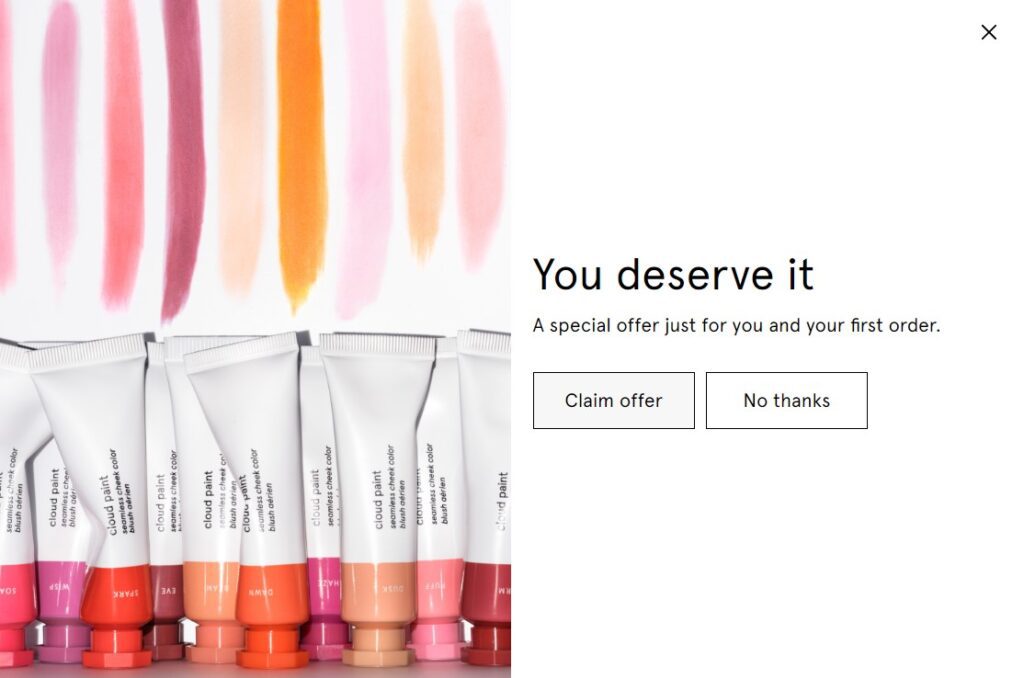
Image via Glossier
One of the most popular types of popups is exit-intent popups, which you can display before a user is about to leave your website.
These are typically used to either encourage them to provide their contact information or incentivize them to make a purchase.
Hello Bar can help you create engaging popups to help you generate more leads from your website. Here’s an exit-intent popup template that you can customize to suit your requirements.
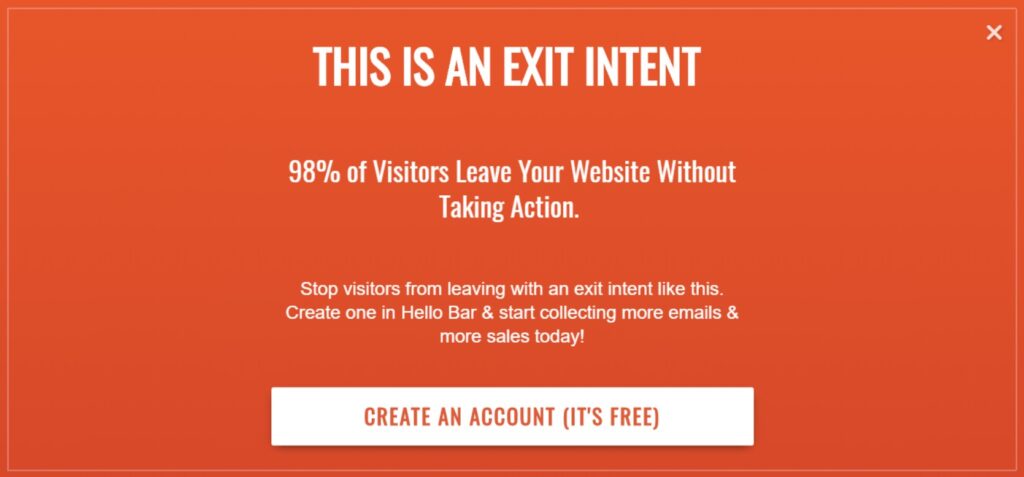
Image via Hello Bar
Creating popups on Hello Bar is simple and doesn’t require any technical skills or much time and effort. Simply use a template, customize your offer, use your branding, and launch it.
However, you need to be careful about not overusing popups.
If you use them too often, they will be annoying, and your visitors will be less likely to take action.
9. Leverage Quizzes to Generate Leads
This is a simple tactic that’s easy to implement and can help you generate more leads from your website.
Here’s how it works:
- Ask your site visitors to take a quiz to get personalized product or service recommendations.
- Once they finish the quiz, ask them to provide their email address to access the results.
- Every email address you collect is a potential lead that you can nurture via email marketing.
Many brands use this strategy to collect leads from their website. This is especially popular among beauty brands as personalized beauty routines are trending.
Hawthorne, a personal care brand for men, does this really well with a detailed quiz to understand each consumer’s lifestyle and preferences.
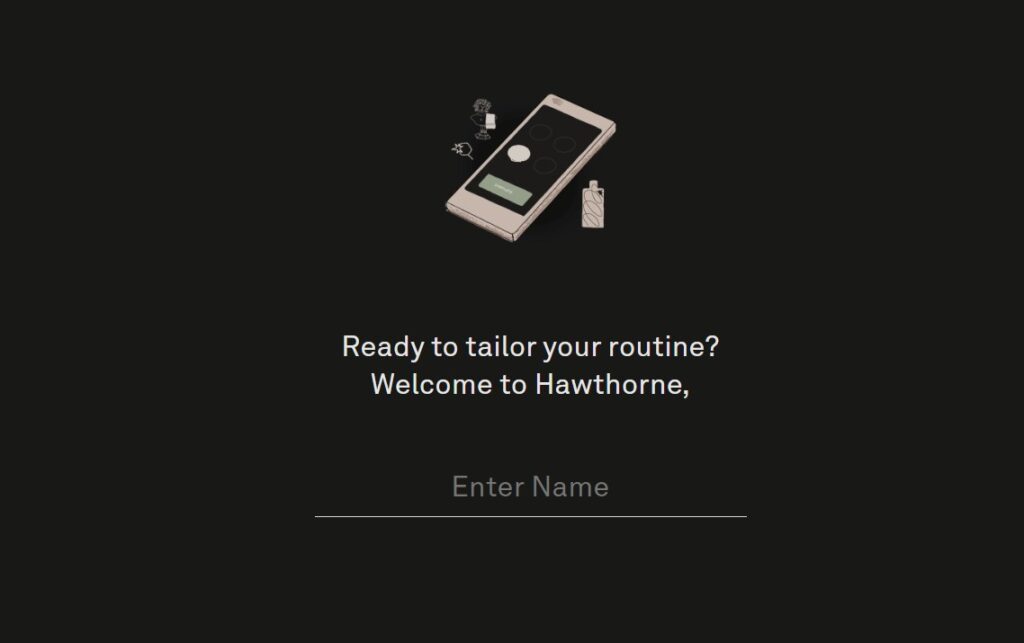
Image via Hawthorne
FAQ
Q1. How do I drive more traffic to my website?
Creating valuable content and optimizing your website for search engines are two of the best ways to get more traffic to your website.
When you create content that’s relevant and useful to your target audience, they will organically discover it when they search for relevant keywords on Google.
Using SEO tactics, you can build your site authority and ensure that your website ranks high for your target keywords.
Lastly, you can also consider promoting your latest blog posts on social media, with a direct link to the respective posts. This will help drive social traffic to your website, which will eventually help you generate more leads from your website.
Q2. How can I get more leads from my website?
There are many tactics you can use to generate more leads from your website.
Here are some top tips to get you started.
- Strategically place CTAs throughout your website, asking site visitors to take desired actions and sharing their contact details in the process.
- Create dedicated landing pages for each product, service, or offer. List the benefits of what you offer and use a strong CTA and a form to capture new leads.
- Place signup or other types of lead-capture forms across your website, with persuasive copy that nudges site visitors to fill in their details. Offer a clear value proposition to get more conversions through your lead-capture forms.
- Use lead magnets like gated content to capture leads or offer other incentives to encourage people to provide their contact information. The more lucrative incentives you offer, the more leads you will generate from your website.
- Leverage website popups to promote your ongoing offers and display your newsletter signup form.
Q3. How do I optimize my website for lead generation?
Bring more traffic to your site by creating great content and using SEO. Turn these site visitors into leads by using strong CTAs and high-converting landing pages. Capture leads via opt-in forms and popups, and ensure you place them strategically across your website.
Q4. How do I turn my website into a lead-generation machine?
Leverage popups triggered by specific user actions to display lucrative offers to convert site visitors into leads. Also, use various lead magnets and create dedicated landing pages for each to run your lead-generation campaign on autopilot.
These will help turn your website into a lead-generating machine.
Q5. What is the fastest way to generate leads?
Running time-limited promotional offers is one of the fastest ways to capture leads. Experiment with different offers on your forms and popups and use the ones that get the best results for your lead-generation website.
In Conclusion
Generating leads is essential for any business, and there are many different ways to generate leads online.
Using the methods described in this article, you can increase the number of leads your website generates.
Note that the methods described in this article are just a few of the many ways to increase leads.
Be sure to experiment with different methods to find the ones that work best for you and your business.
If you want to increase your website leads, then contact Hello Bar today and optimize your lead-generation efforts.







